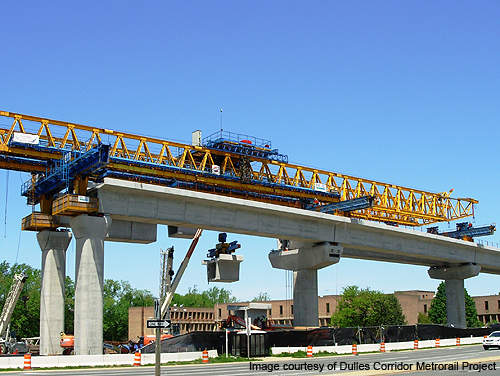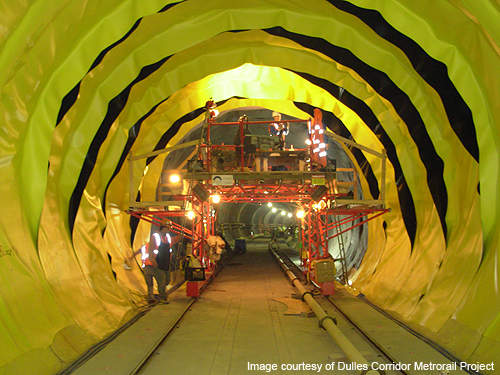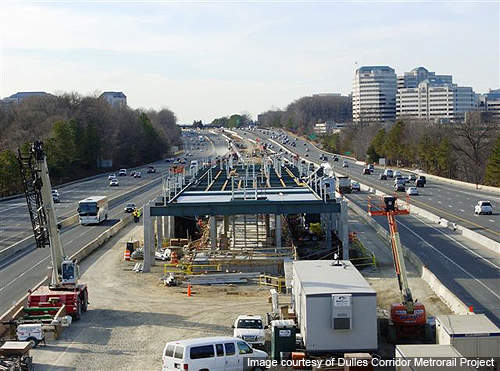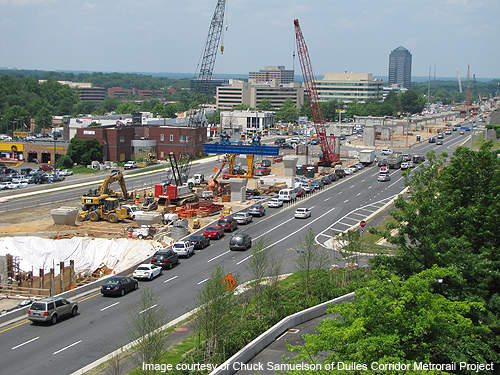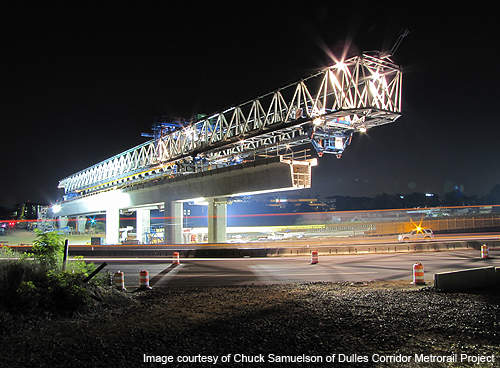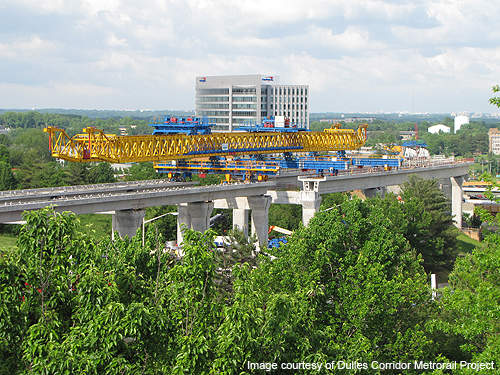The Dulles Corridor Metrorail Extension Project, also known as the Silver Line, is a 23-mile extension of the existing 106-mile Metrorail system, which serves Washington DC and parts of Maryland and Virginia, US. The extension runs from East Falls Church to Washington Dulles International Airport westward to Ashburn.
The project has been undertaken to increase the capacity of the existing metro system and extend its services to new areas. The project will serve Reston, Herndon area and Tyson Corner, as well as offer a comfortable one-seat ride from Dulles International Airport to Washington.
The project is managed by The Metropolitan Washington Airports Authority (MWAA) and will be turned over to the Washington Metropolitan Area Transit Authority (WMATA) to operate after completion.
The extension is expected to serve approximately 85,700 passengers a day by 2030.
Dulles Corridor project
The Dulles Corridor proposal has been envisioned since Dulles Airport opened. In the 1990s, serious efforts to build this project began and the decisions were made to undertake the Draft and Final Environmental Impact Studies necessary to build the system. The project was initially approved by Washington Metropolitan Area Transit Authority (WMATA) board, Commonwealth Transportation Board (CTB), the Metropolitan Washington Airports Authority (MWAA) Board, Loudoun County and Fairfax County in 2002.
The project includes construction of 23-miles of extension and 11 new stations and a rail yard. It is being built in two phases. The first phase includes construction of an 11.6-mile extension line from the Orange Line at East Falls Church to Wiehle Avenue and four metro rail stations at Tysons West, Tysons East, Tysons Central 123 and Tysons Central 7 (partly below surface station). Phase 1 started operations in July 2014.
The second phase will include construction of an 11.5-mile extension line between Wiehle Avenue and Ashburn. Six new stations will be built during this phase at Route 772, Herndon Monroe, Reston Parkway, Route 28, Dulles International Airport and Route 606. A major rail yard at the airport will also be constructed during this phase. Construction of Phase 2 started in 2013 and is expected to be completed by 2018.
The overall cost of the first phase is estimated to be $2.9bn, while the second phase is expected to cost around $2.8bn.
Financing
The project is funded by a number of resources. The Australian Federal Government funded $900m for Phase I. The Commonwealth of Virginia provided $252m in non-toll funding and an additional $150m of pass-through federal transportation grants for Phase 1. The Commonwealth has also committed $323m for Phase II. Fairfax County, Loudoun County and the Airports Authority have committed to fund 25% of the overall project cost. The remaining costs will be funded through revenue bonds backed by the Dulles Toll Road revenues.
In July 2011, Fairfax County Board in Virginia gave preliminary approval for funding to the second phase of the project. The county intends to fund construction of the metro station at Route 28 at an estimated cost of $83m, a parking garage at the Route 28 station at a cost of $53.5m and parking at Herndon-Monroe station at cost of $51.4m. The county also approved the cost-sharing plan of the US Department of Transportation, which proposed to reduce the cost of second phase to $2.8bn from the $3.83bn previously proposed.
Dulles Corridor Metrorail construction
Construction of 11.6-mile Phase I began in March 2009. It includes a six-mile elevated track that carries Metrorail trains at heights up to 65ft above the Capital Beltway and over Tysons Corner. A 2,400ft underground tunnel connecting two Metro stations in Tysons Corner was also part of the phase. Five new stations with the facilities such as pedestrian bridges, escalators and elevators were also built under this phase.
The Phase I construction also included two short tunnels under a small portion of Tysons Corner, construction of bridges for aerial tracks throughout Tysons Corner, including crossing a major interstate highway.
Project contractors
In March 2009, Dulles Transit Partners, a team of Bechtel and URS, received notice to proceed on the $1.6bn lump sum design-build contract for Phase I of the Dulles Corridor Metrorail Project. Under the contract DTP is providing engineering, procurement and construction (EPC) services to complete Phase I.
Capital Rail Constructors, a joint venture of Clark Construction and Kiewit Infrastructure South Co. was awarded a design-build contract for Phase 2 by the MWAA in April 2013.
Rolling stock
The Metrorail Extension project will use the 7000 series cars from Kawasaki Rail Car.
A total of 128 cars will be used on the Silver Line, including 64 cars each for each phase. The cars are designed with latest technology such as digital displays, communications network and CCTV cameras. The sample cars were delivered for testing in January 2014.

